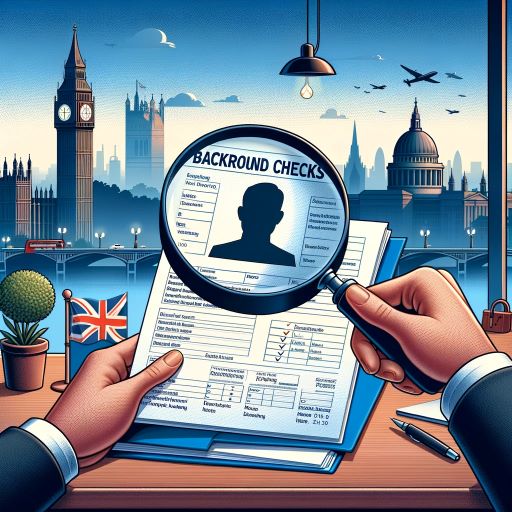

If you're a non-UK national, make sure you provide proof of residency along with other required documentation. Additionally, be prepared to submit detailed employment history records like payslips and tax documents to validate at least three years of work experience.
Lastly, employers conducting BPSS checks must have clear policies in place for handling sensitive information and addressing any security concerns that may arise. These policies should outline the steps to be taken if a potential security threat is identified during the BPSS process, including how to manage and mitigate such risks appropriately. By adhering to these rules, employers not only protect the integrity of their operations but also uphold the rights and dignity of their employees, ensuring a secure and respectful work environment.
- Familiarize yourself with the guidelines and protocols for handling UK OFFICIAL information.
In these sectors, verifying the eligibility and trustworthiness of individuals handling government-related tasks is essential. By mandating BPSS checks for these specific roles and sectors, organizations can maintain secure environments, prevent unauthorized access to data, and enhance trust in their recruitment processes.
When undergoing a BPSS check, you're subjected to a thorough screening process to confirm your trustworthiness and eligibility for accessing sensitive information. This screening, which is a baseline personnel security standard in the UK, includes checks like Basic DBS Check, ID Check, Right to Work check, and 3-Year Employment History Check.
What Is in a BPSS Check? When you undergo a BPSS check, various screenings are conducted to confirm your trustworthiness and eligibility for accessing sensitive information. These checks typically include Basic DBS Check, ID Check, Right to Work check, and 3-Year Employment History Check.
Baseline Personnel Security Standard (BPSS) is typically required for individuals applying for roles in various government departments, agencies, or organizations where access to sensitive information or assets is necessary. Some examples of roles that may require BPSS clearance include:
1. Administrative staff in government departments or agencies.
2. Contractors and consultants working on government projects.
3. Support staff in defense or intelligence organizations.
4. Individuals handling classified or sensitive data.
5. Personnel working in law enforcement agencies.
6. Employees in healthcare organizations dealing with patient information.
7. Staff working in financial institutions with access to sensitive financial data.
8. Employees in educational institutions with access to student records or research data.
9. IT professionals managing sensitive information systems for government bodies.
10. Personnel in critical infrastructure sectors such as energy, telecommunications, or transportation.
These are just examples, and the specific roles requiring BPSS clearance may vary depending on the organization and the nature of the work involved. It's essential to check with the employer or relevant authority to determine if BPSS clearance is necessary for a particular role.
Yes, a right to work check is typically included as part of the Baseline Personnel Security Standard (BPSS) clearance process in the UK. This check ensures that individuals have the legal right to work in the UK and are eligible to access employment opportunities requiring BPSS clearance.
The right to work check verifies an individual's immigration status and may involve examining documents such as a passport, visa, biometric residence permit, or residence card. Employers or organizations conducting BPSS clearance will verify that the candidate has the necessary documentation to legally work in the UK.
Ensuring that individuals have the right to work is a crucial aspect of the BPSS clearance process, as it helps maintain compliance with UK immigration laws and prevents unauthorized individuals from accessing sensitive roles or information.
What Is the Difference Between Bpss and Dbs? When distinguishing between BPSS and DBS checks, it's vital to recognize that BPSS focuses on national security vetting, identity verification, and right to work status, while DBS solely examines an individual's criminal record.
In industries where security is paramount, BPSS clearance acts as a first line of defense against potential internal threats. By vetting employees thoroughly before employment, organizations can prevent the exploitation of sensitive positions and protect against security breaches.
Although the right to work is typically verified at the start of employment as part of BPSS checks, it may need to be reverified if an individual’s circumstances change, such as the expiration of a visa or changes in immigration status. Continuous monitoring ensures ongoing compliance with legal requirements and maintains the integrity of the workforce.
Renewal and revalidation of BPSS clearance should be conducted periodically, especially for employees in long-term sensitive roles.
To initiate the process of conducting a BPSS check, start by gathering all necessary documentation and information for the screening requirements. Follow these steps to guarantee a thorough BPSS clearance:
Airport security staff are required to have BPSS clearance because they work in sensitive zones and deal with threats to national and international travel security. This role involves access to restricted areas where the integrity and trustworthiness of personnel are paramount.


Under the Immigration, Asylum, and Nationality Act 2006, employers are required to perform right to work checks to confirm an individual's eligibility to work in the UK. BPSS clearance incorporates these checks, aligning with legal requirements to prevent illegal working and ensuring that all employees have the necessary authorization to work.
To guarantee your suitability for BPSS clearance, gather the necessary verification documents, including proof of right to work in the UK and identity verification papers such as a passport or driver's license. These documents are essential for confirming your eligibility and identity during the clearance process.
Organizations that require a Baseline Personnel Security Standard (BPSS) check generally include those involved with national security, government contracts, or any sector where security is paramount.
- Complete and submit all required documentation accurately and truthfully.
- Report any changes in personal circumstances that may affect your clearance status promptly.
Transportation officials, especially those involved in overseeing or managing public transport security, require BPSS clearance due to the potential risks associated with transportation infrastructure and mass transit systems.

in sensitive positions are thoroughly vetted, organizations can assure the public that they are taking all necessary steps to safeguard sensitive information and critical infrastructure.
Baseline Personnel Security Standard (BPSS) checks and BS7858:2019 checks are both integral to pre-employment vetting in the UK, but they serve different purposes and are structured to meet the needs of different sectors.
By verifying nationality, immigration status, employment history, and criminal records, organizations can assess the suitability of candidates for positions requiring access to sensitive information like the Public Services Network (PSN).
Lacking BPSS Clearance could restrict access to certain roles and delay or prevent employment in positions requiring security clearance.
There is typically no cost for individuals as it is often covered by the employing organization.